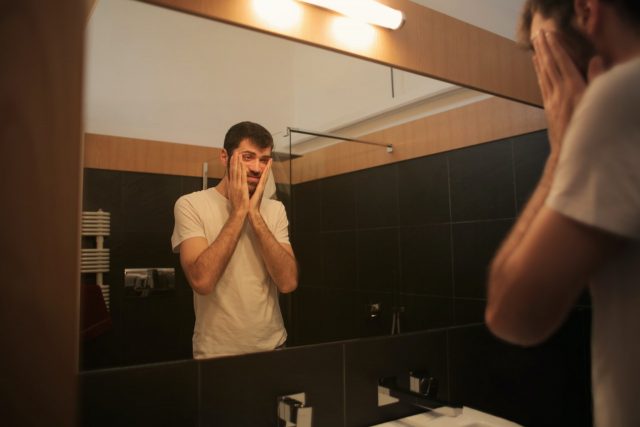

Does this sound familiar?
You call up all your friends and loved ones to inform them about your plans to quit using drugs or alcohol.
You are so sure about it and believe that nothing can get in the way.
So you quit cold turkey, with no help. And just as everything seems to be working out perfectly, the unexpected happens – you slip back in and start using again.
If this is familiar, you are not alone. 19.7 million American adults aged 12+ years struggled with substance use disorder in 2017. This is according to the National Survey on Drug Use Health (NSDUH). Of this number, 38% battled an illicit drug use disorder.

Millions of Americans struggle with addiction. You are not alone. Help is available.
The reason you keep going back is that drug addiction is not just a habit. It is a brain disease. When you use drugs for a prolonged period of time, it can change the way nerve receptors work in your brain. Addiction changes the way critical parts of the brain function, so much that you have a hard time quitting drugs – even if you want to. According to brain science research, addiction:
Addictive drugs alter the way the brain regulates moods and processes emotions. Most of these changes flood the brain with serotonin and dopamine neurotransmitters that create an artificial feeling of “high,” or pleasure. This is one of the reasons you find it hard to choose to do the right thing. The other reason is the issue of withdrawal symptoms.
Drug withdrawal is a group of symptoms that happen when you discontinue or reduce the intake of recreational or meditational drugs abruptly. To experience withdrawal syndrome, you must have first developed a form of drug dependence.
If you become physically sick after quitting, it may be an indication that you are physically dependent on the drug. This is usually your body’s way of responding to the absence of the substance. You may also become dependent on drugs or alcohol to prevent withdrawal symptoms or pain.

While every person experiences it differently, withdrawal symptoms can seem unbearable for some.
Note that the severity and nature of the withdrawal symptoms that you experience will vary based on the level of substance dependency along with other factors like:
As an example, a person who takes large dosages of opiate for years through injection and has a family history and/or an underlying mental health problem will experience more extended withdrawal periods and more severe symptoms than one who has been using smaller doses for months. Although the effects and severity may differ, one thing is sure; withdrawal symptoms will be present as long as dependence is formed.
Drug withdrawal symptoms differ based on a range of aspects, as discussed above. Some drugs like methamphetamine, cocaine, and prescription ADHD meds may have far-reaching emotional withdrawal symptoms. Others, like prescription drugs and heroin, cause extremely uncomfortable physical withdrawal symptoms that mirror flu-like symptoms.
We cannot talk about drug withdrawal symptoms without mentioning alcohol. After all, acute alcohol withdrawal is amongst the most dangerous withdrawal periods of all substances and drugs and can cause potentially life-threatening symptoms. For this reason alone, the process must be approached with care or be done under medical supervision.
Benzodiazepines (Ativan and Valium) can also have adverse withdrawal symptoms like alcohol. The only difference is that alcohol symptoms appear hours after the last drink and subside within a week. Benzodiazepines, on the other hand, take up to a month. Like alcohol, benzodiazepine withdrawal symptoms include hallucination, elevated heart rate, and blood pressure, delirium, and seizures.
Opiate (heroin, OxyContin or hydrocodone) withdrawal symptoms aren’t as severe as those from alcohol and benzodiazepines but can cause muscle cramps, aches, runny nose, sleeplessness, nausea, and vomiting. Opiate withdrawal symptoms are often flu-like.

Many addicts report flu-like symptoms from their experiences of withdrawal.
Don’t attempt to quit “cold turkey” after dependence has formed. Evidence shows that this is not the best way to stop. Only a small percentage of patients succeed this way. Besides, the physical aspect of withdrawal is too much to handle alone. Many people who have an opioid addiction end up resuming use to stop the resulting symptoms. So, you should quit gradually with the help of medical professionals. Your symptoms will be managed through a medical detox program as part of a holistic addiction treatment plan.
Withdrawal symptoms can range from mild gastrointestinal upset and nausea to potentially life-threatening seizures. These symptoms often present opposite reactions than those associated with the drug or substance. They include:
The first symptom can appear within 12-24 hours of use and tend to be worse for the first 48-72 hours. However, the symptoms gradually start to decline as your body adapts to the new normal. The whole process can last up to 14 days.

With the right help, addiction recovery is entirely possible. Take the necessary steps and change your life!
Although you can detox privately at home, there are numerous reasons why doing so might not be the best choice. For starters, it may not be safe because you are unsupervised. Remember, issues like violence, injury, psychosis, medical illness, and even threat to self can arise a few hours after drug detox. Besides, at-home drug detox is usually ineffective. So, it is best to get care at a reputable treatment center.
Drug and alcohol detox is the first step in a holistic treatment program that provides all the necessary tools needed for recovery. Detoxification can prevent unpleasant or adverse side effects arising from sudden cessation of use and can help you become abstinent from alcohol or drugs.
Drug detox lasts as long as the withdrawal symptoms are present, and for as long as it takes you to stabilize both mentally and physically. Medical detox aims to stop the abuse of substances and also prepare you for the work that lies ahead on counseling and therapy.